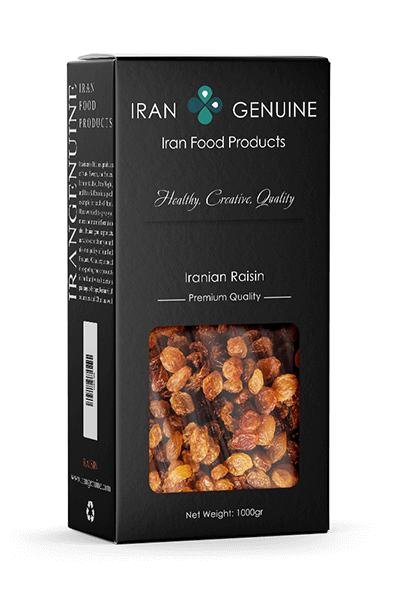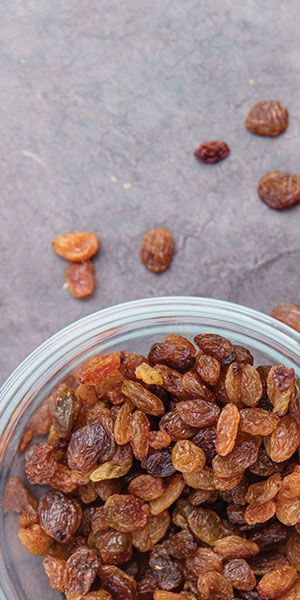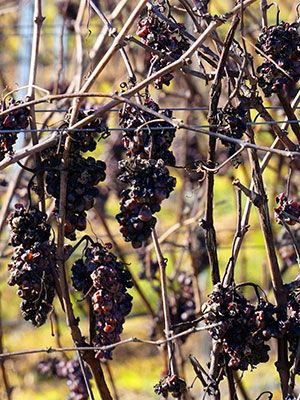
Fat (Per 100 gr)
0.5 g
Calories (Per 100 gr)
299 Kcal
Carbs (Per 100 gr)
79 g
Chol (Per 100 gr)
0 mg
Iran Raisin
Raisins are also called dried grapes. They are full of iron, potassium, calcium, and group B vitamins. It also has anti-oxidant benefits, which means raisins prevent cellular deterioration. Depending upon the type of grapes used, method, ingredients, and conditions of drying involved, raisins are sold in the market with different names. Like other dried fruits, it is available throughout the year.
The fiber in raisins is linked to the prevention of colon cancer as well as bodily control of blood glucose. Raisins also function as a laxative, helps stave off lethargy, and aids with dehydration. It strengthens the body and promotes good odor in the mouth. Raisins contain a substantial amount of fibers, which contributes to oxidation and energy in the body. Nutritionists hold that daily uptake of some raisins helps us to have a strong memory, thus immunizing people from Alzheimer's disease. A tremendous amount of fiber in raisins helps to reduce cholesterol and better the functioning of the intestines. Potassium in raisins leads to reduced blood pressure. Bones get strengthened and healthy because of plentiful calcium in raisins, preventing osteoporosis, a bone disease. Raisin's high content of cilium is good for the skin.
History of Raisins Production
The origin of raisin production goes back all the way to 2000 BC in Iran and Egypt. Raisins were famously used in Rome as a prize for people who decorated places of worship like temples. It was also used for winners of championships and tournaments. Today, farmers produce raisins in a large amount from various species of grapes using different methods.

Consumption of Raisin
Due to their high fiber content, raisins are used as natural laxatives when combined with water. Eating them helps prevent constipation and keeps your digestion process in check throughout the day. Raisins are full of natural sugars and are great to control your sweet tooth without consuming extra calories.
There is however some concern about eating too many raisins increasing soluble fiber. Consumption of too much fiber might lead to gas and diarrhea, so raisins must be eaten in moderation. How you eat has a leading role in your health. While eating any extra calories produced from fast food, ice cream, and other "junk foods". the result will be weight But since raisins are pure unprocessed, unless they are consuming in excess, they only have benefits.

Raisins Planting And Harvesting
Raisin plants need moderate winters (frost-free climate) and a long, dry, and warm season. Long Summers is required to ripen the fruit and to facilitate the sun drying process because the fruits are highly prone to damage from rains. 36 degrees centigrade temperature is suitable for raisin production.
Cultivation District of Raisins
Malayer city in Jowzan valley, which is in the beautiful province of Hamedan cultivates traditional grapes. It is known as part of the significant Agricultural Heritage System. Iran in this respect designated Jowzan Valley grapes as a producing area of raisins in early 2017. The vineyards of Malayer cultivate about 90 percent of the grapes producing in Hamedan.
Types of Raisin
Sultanas
These are originally named after Turkish green grapes from which the cultivar is generated. They are now most commonly using to produce the raisin called Thompson Seedless.
Chisel green raisins
They are very thin and about 2-3 cm long. These raisins are originated and produced across The Middle East and Central Asia. They are well-known for their slightly dense and chewy flavor.
Golden Raisins
They look like natural seedless raisins and are gotten the grape variety known as Thompson or golden no-seed grapes.
Yellow Raisins
They are processed like chisel green raisins that use sulfur gas to make smoked raisins.
Tiffy raisins
Like sunny raisins, they are dipping into nitric acid and are dried in shady places.
Sunny Raisins
Different varieties of grapes such as Sabz Mal and Razgi are used to produce sunny raisins. The grapes are placing in nitric acid after being harvested and then spread in a clean place and exposing to direct sunlight for drying.
Zante Currant
The Razgi cultivar is used more often for making zante currants. The grapes are spread after harvesting in a clean and pollution-free place to be collected after drying.
Maviz Raisins
Maviz is a type of raisin made from Shahani grapes. Raisins are mostly used for small dried grapes and Maviz for large grapes.
Export of Raisin
Raisins are exporting in varieties of golden, nitrified, and Kashmar raisins. In terms of production level, raisins are higher than dates in world markets. Iran currently stands third for exporting raisins to world nations. Iran stands as one of the top exporters across the world. Iran exports 27 percent of the world’s raisins, which brings in 250 million dollars per annum. It sends its produced raisins abroad to more than one hundred countries of the world, such as Italy, the United Kingdom the U.S, and France. The Islamic Republic of Iran produces 122,595 metric tons of raisin annually; these numbers are based on the harvest during 2014-2015.
Australia imports raisins from Iran packs them in Australian branding and exports them to other countries. Some of the common raisin varieties grown in Iran include golden, sultan, green and black raisin. Iran stands first in terms of varieties of raisins in the world. Iran’s exporting competitors for raisins in the world are the countries of Turkey, America, and Greece.

Benefits of Raisin
- Improving bone health, iron levels, acidosis, fever, and sexual dysfunction.
- Aiding as well as for their positive impact on eyes, teeth, and hair.
- Protecting your teeth against decay, cavities, and brittleness.
- Promoting good sleep
- Reducing hypertension,
- Promote weight gain
- Keeping kidney healthy
- Managing diabetes
- Treat anemia
- Prevent cancer
- Helping lower the risk of fever
- Being good for sex life
- Providing better nutrition to the capillaries of the eye
- Counteracting stomach acidity
- Raisins also offer many nutritional benefits, and their per portion calories are high, so they can work well in a weight gain diet.
Properties of Raisins
- They contain rapidly absorbable carbohydrates, 70% fructose
- High doses of vitamins and minerals, B vitamins
- Provide high content of fructose and organic acids and pectin
- Provide cooling properties
